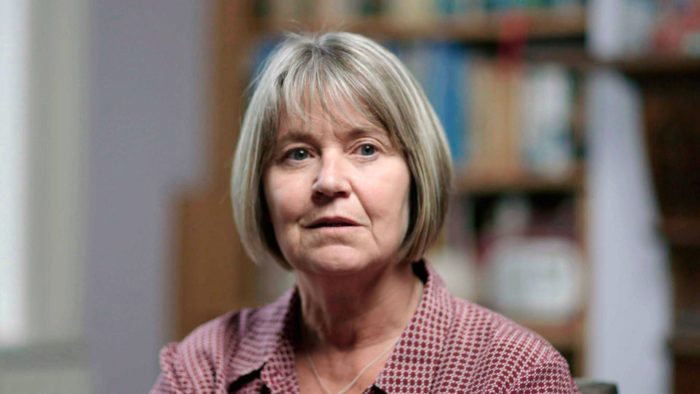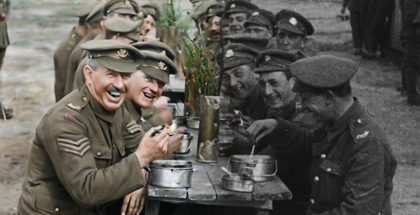True Crime Tuesdays: The Yorkshire Ripper Files: A Very British Crime Story
Review Overview
Social history
9Institutional misogyny
10Feminist filmmaking
9Helen Archer | On 18, Jun 2019
Every Tuesday, our resident true crime obsessive gets their fix with a documentary film or series. We call it True Crime Tuesdays.
Towards the end of this three-part documentary, Joan Smith, one of the journalists interviewed, says of the Yorkshire Ripper investigation: “It was a conversation among men. About dead women.” It’s an accusation that could be levelled at many true crime documentaries. Liza Williams’ series swerves that accusation completely by concentrating her (female) gaze on the misogyny at the heart of the case – a misogyny apparent not only in the perpetrator, but also in the police investigating the crimes, the court, the media, and society as a whole.
The string of murders spanning from 1975 to 1981 led to the biggest manhunt in British criminal history. Peter Sutcliffe – dubbed the ‘Yorkshire Ripper” by a press in a deliberate throwback to the 19th century’s Jack the Ripper – murdered thirteen women and brutally attacked at least eight others. His crimes have made their mark on popular culture – so much has been written and filmed that another documentary on it seems perhaps overkill. But this is a very welcome fresh look at a case many people are all too familiar with – so comprehensive, so quietly angry about the failures of the time, as to be the last word on it.
It also acts as a kind of social history, telling the story of poverty, the class system, and institutional misogyny infecting public spheres. Much weight was given at the time to ‘Wearside Jack’, a hoax caller who fooled the investigators and allowed Sutcliffe to go un-apprehended for five years, despite being taken in for questioning nine times – but Williams documents the way in which eyewitnesses were disregarded and leads left unfollowed, because of the tunnel vision and unconscious biases of the men working on the case. She does this through revealing interviews with pathologists, journalists, police, defence and prosecution lawyers, sociologists, activists, as well as survivors and the relatives of the victims.
There are numerous stories here of women having to take on survival sex work, in order to keep a roof over their head and food in their children’s mouths, and the complete lack of societal empathy is evidenced in archive footage. When Wilma McCann was found dead in a playing field in Chapeltown – a red light district on the outskirts of Leeds – in 1975, she was quickly labelled a prostitute, although there is nothing to indicate she was. But as more sex workers were targeted, the police, papers, and public settled on a narrative that the Ripper’s motivation was to ‘clean up the streets’. It was only when women the police couldn’t characterise as prostitutes were killed that the investigation was ramped up.
When 16-year-old Jayne MacDonald was found murdered in summer 1977, she was described by police as an “innocent victim”. An open letter printed by newspaper stated that the Ripper’s “crusade against street workers had gone … terribly wrong”. Again, when he killed his 10th victim Josephine Whitaker, a 19-year-old bank clerk, in 1979, George Oldfield – head of the Ripper squad – said: “If there is a link, the it would appear that once again he has made a mistake, because Miss Whitaker was a very respectable young lady, whereas most of his victims have been of somewhat doubtful moral character.”
Time and again, this attitude rears its head. Olive Smelt – whose daughter is interviewed here – was not involved in sex work, so her eyewitness testimony was initially discounted. Yet later, in a special notice sent round by police, she was described as being “of loose morals” – purely, it seems, in order to make her fit the pattern of the Ripper as a ‘prostitute killer’. Richard McCann, son of Wilma, tells a story of being at a friend’s house and overhearing an adult saying that the victims “deserve all they get”. What the police completely failed to understand was that it was simply easier to pick out women in red light districts, where they were more vulnerable to attack.
As the level of fear mounted, police targeted street workers, arresting and fining them for soliciting. They would have to go back out onto the street in order to pay the fine, risking their lives again and again because the system demanded it. A sociologist explains that street harassment became more widespread during this period, while there is shocking footage of a football match where the fans chant “there’s only one Jack the Ripper”. There was pushback, at the time, from feminists. After Jacqueline Hill was killed on her way home to student halls, police suggested a curfew for lone women, leading to a mass “Recall the Night” march in Leeds. It was, says activist Al Garthwaite, the catalyst for a growing feminist movement, as their anger turned on police.
By Episode 3, Sutcliffe is arrested, having been picked up on a routine traffic stop. Williams investigates the casual misogyny of the courtroom, where barristers talked about working class women drinking too much and “distributing their favours widely”. Demonstrations were held outside the courtroom by the English Collective of Prostitutes, while inside, the prosecution stated of the victims that “some were prostitutes – but the saddest thing is that some of them were not”. Meanwhile, the papers were busy blaming Sutcliffe’s wife for his crimes, implying that her ‘nagging’ must have led him to seek out women to kill.
In all of the interviews, it’s the families of the victims who stand out – 23 children were left motherless – as well as the survivors whose evidence was ignored. Had the police believed women, murders could have been prevented. This is an emotional, heartfelt, anger-inducing programme, clear-eyed and forensic in the way it holds the powerful to account and gives a voice to the victims. It should be a game-changer for true crime documentaries – a truly feminist piece of filmmaking on a crime which seems almost archetypal.
The Yorkshire Ripper Files: A Very British Crime Story is available on BBC iPlayer until 6th January 2021





















